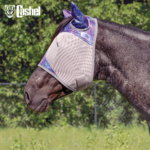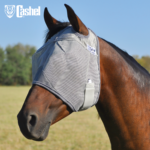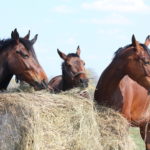You can reduce your horse’s risk of choke, colic and respiratory disorders and increase the amount of nutrients he gets from his ration by doing nothing more than eliminating chest- or head-high feed tubs and hay racks.

Floor-level feeding of both hay and feed mimics the natural heads-down grazing posture, which brings with it several health benefits:
- Slowed rate of consumption–The horse must be more meticulous in his chewing to hold onto the hay and grain he’s processing. Compared to chest-high intake, each mouthful of floor-fed feed is smaller, more thoroughly chewed and better mixed with saliva, lowering the horse’s choke and colic risks.
- Improved processing–Increased chew time and greater salivation prepare each bite for more complete nutrient extraction down the line, increasing the nutritional benefits from each bite.
- Reduced exposure to respiratory irritants–Eating with a lowered head encourages airway drainage, the first line of defense against deep inhalation of feed-related particles and dust. Successful floor-level feeding involves safety and cleanliness considerations.
Stabled horses can be injured or entangled by sharp-edged or poorly designed feeding equipment taking up their foot space, and parasite infestation can be increased if they have to pick grain and hay out of soiled bedding.
Orderly horses do well with their hay provided on the floor opposite from their usual droppings site and with grain fed in the shallow, reinforced rubber feed tubs designed for that purpose. Although the tubs are safe enough to remain in the stall round the clock, between-meal removal reduces manure contamination and wear and tear.
Advertisement
For horses who paw while feeding or scatter their hay and grain about, secure the feed tub in the clean corner with a length of baling twine, which will give if an entanglement occurs, and install a homemade or commercial hay “box” that corrals hay at floor level. Take care that the hay box’s construction is horse safe.





